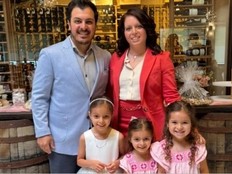SEX FILES: How emotional oversharing can derail dates

Article content
Reviews and recommendations are unbiased and products are independently selected. Postmedia may earn an affiliate commission from purchases made through links on this page.
A couple of months ago, I went on a first – and final – date with a man I’d met through mutual friends. Within ten minutes of sitting down, he told me he was a recovering sex addict and shared details of the abuse he’d experienced as a child. While those disclosures aren’t necessarily red flags on their own (though the sex addiction did give me pause), the timing felt abrupt and overwhelming. I could have easily matched him with my trauma – because, trust me, I’ve got plenty – but I held back. The whole interaction felt like too much, too soon. Unsurprisingly, I declined a second date.
There’s a word for this type of behaviour: floodlighting.
Floodlighting happens when someone reveals significant personal information while dating or in the early days of a relationship. Although it can easily be mistaken for emotional openness or vulnerability, floodlighting makes you feel uneasy or overwhelmed. In some cases, like when I was on a coffee date, one person’s floodlighting can make the other person feel like they need to reciprocate intimate details before they feel ready.
AsThomas Westenholz, an EFT Couple Therapist, explains, “Genuine vulnerability is paced, mutual, and responsive. Floodlighting feels like a monologue, too much, too soon, without checking in. If someone drops deep trauma in the first 20 minutes without asking how it lands for you, that’s not connection; that’s emotional dumping.”
In the days following the coffee date I mentioned above, I asked, “Why did he feel the need to share that with me?” According to experts, there are several reasons why someone might revert to floodlighting.Ruth Rathblott, MSW, author of Singlehandedly: Learning to Unhide and Embrace Connection, says that foodlighting can stem from fear of rejection or a deep need to be seen and validated. “It’s a way of ‘unhiding’ without true connection — almost like hiding behind the flood of information; it can be a facade of vulnerability.”
Floodlighting manufactures emotional intimacy, says Westenholz. He explains, “Some seek validation; others want to test if you’ll stay. Underneath it all, it’s usually anxiety, ‘If I show you everything now, maybe I won’t be rejected later,'”
Similar to love bombing – when someone overwhelms a new partner with over-the-top affection and gifts to gain control or fast-track emotional intimacy – Floodlighting can also be used as a manipulation tactic to control the relationship. Instead of romantic grand gestures and compliments, they’re dumping their trauma, so you feel close to them.
Even if the floodlighter doesn’t have ill intentions, floodlighting has consequences. “It can create false closeness or push people away. The sharer may feel exposed and regretful, while the listener may feel pressured to match the intensity or hold space they didn’t consent to,” says Westenholz. In other words, Westenholz says, “It short-circuits trust instead of building it.”
If you find yourself the target of floodlighting, there are several tactics you can use to redirect the conversation. Westenholz encourages people to address it as it happens, “Try: ‘Thanks for trusting me, that’s a lot to take in this early on. Can we slow things down a bit?'”
As Westenholz explains, the urge to floodgate can often signify attachment styles or deeper relational issues that developed in childhood. He says, “It often signals anxious or disorganized attachment, a fear of abandonment mixed with a need for instant closeness.” Additionally, “It can also be a trauma response: oversharing as a survival strategy.”
By redirecting the conversation, you let the person feel heard and understood without shaming them while gently setting a boundary.
While problematic, floodlighting doesn’t have to be a relationship non-starter. Building a healthy connection is possible with awareness, boundaries, and open communication. “The person who floodlights may benefit from therapeutic support to understand their patterns and develop healthier pacing in emotional disclosure,” says Mary Zamil, MA, RP, a Registered Psychotherapist. In return, the other partner can set boundaries and create a sense of emotional safety, so the need to floodlight isn’t as strong.
Westenholz reminds us that healthy relationships grow in layers, not emotional avalanches. Ultimately, he says, “The goal isn’t less sharing; it’s more attunement.”











Postmedia is committed to maintaining a lively but civil forum for discussion. Please keep comments relevant and respectful. Comments may take up to an hour to appear on the site. You will receive an email if there is a reply to your comment, an update to a thread you follow or if a user you follow comments. Visit our Community Guidelines for more information.